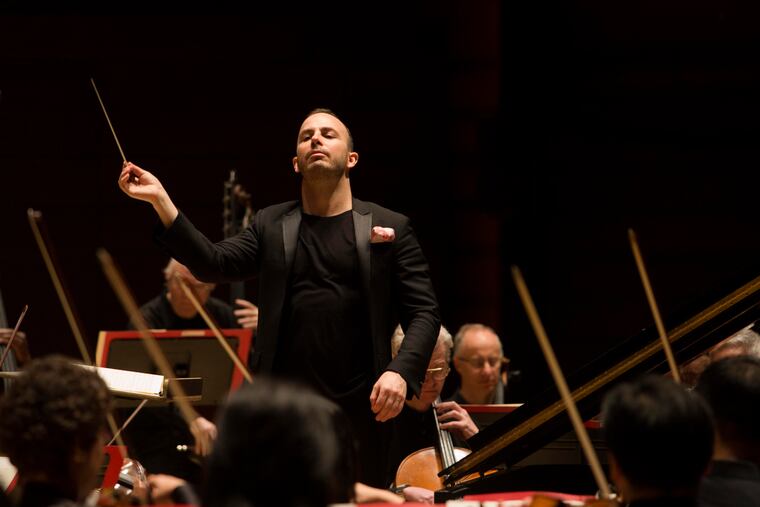Philadelphia Orchestra’s all-Mozart program reveals operas in disguise
Mozart is said to have always been writing operas in various states of disguise: Even in symphonies and string quartets, he composed entrances and exits, whether dramatic or comic, plus melodies that behave like characters.

Mozart is said to have always been writing operas in various states of disguise: Even in symphonies and string quartets, he composed entrances and exits, whether dramatic or comic, plus melodies that behave like characters.
I could argue with that idea, but would be less inclined to do so after hearing the Philadelphia Orchestra’s all-Mozart program on Thursday. Music director Yannick Nézet-Séguin conducted two symphonies (No. 35 and 40) and a concerto (the Sinfonia Concertante K. 364), freely moving toward operatic theatricality according to what was dictated by the symphonic content, and with welcome unpredictably. For example, the minuet movement in Symphony No. 35 (“Haffner”) was true to its formal, aristocratic roots, though that movement’s more evolved counterpart in the Symphony No. 40, written six years later, had narrative, each thematic reiteration arriving with increased intensity and anguish.
You might’ve guessed as much in light of Nézet-Séguin’s annual installment of Mozart opera recordings issued on Deutsche Grammophon. The latest, The Magic Flute, has some problems but none of them in the conducting department, which reflect a growing authority with the Mozartean idiom.
That authority was apparent in the Haffner symphony’s opening movement when melodic lines that conductors usually phrase as a fairly continuous stream of music were broken up in to smaller sections, each with something specific to say, with a cumulative impact suggesting a musical character directly addressing the listeners. The texture was light on basses so as not to envelop the more animated antics everywhere else in the orchestra. In movements less accommodating to a subtext plot, Nézet-Séguin found a theatrically dynamic momentum in the wind instrument writing that came to a slow boil underneath the cover of string sound.
Because Mozart employed a limited range of key signatures (contributing to the music’s seamlessness), Nézet-Séguin’s theatricality safeguarded against the sort of suave sameness that could set in amid the music’s sparkling surfaces. He also inserted small shifts in loudness and softness as a musical idea came to a conclusion — fussy touches that I didn’t find in my score, and contributed little to Nézet-Séguin’s already clear interpretive intentions.
The Sinfonia Concertante truly is an opera without words, with its balanced, witty, soulful dialogue between solo violin and viola soloists. Perhaps because top-flight soloists aren’t so keen to share the spotlight, the piece isn’t played as often as audiences might like. Like the last subscription performance of the piece in 1998, the soloists were drawn from the ranks of the orchestra, a plus with violinist Juliette Kang and violist Choong-Jin Chang because they achieved a sense of ensemble not often heard in concertos. Their playing was on a high level, but not nearly as imposing as typical concerto soloists. Their sense of characterization was mainly a matter of projecting musical logic within the large Mozartean scheme of things, leaving the listeners to parse the more emotional sides of the piece.
In theory, the Philadelphia Orchestra specializes in everything symphonic, though the orchestra's native language is Tchaikovsky with Mozart a bit further down on the list. So a lack of buoyancy in the winds wasn't surprising. But the hygienic effects of playing Mozart is bound to make later Tchaikovsky performances even better.
The program repeats at 2 p.m. Sunday at the Kimmel Center, $52-$169, 215-893-1999 or philorch.org.